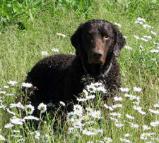
This is a placeholder text
Group text
by Steve Schuler on 31 August 2010 - 06:08
SteveO
by Steve Schuler on 31 August 2010 - 06:08
double post deleted
by Myracle on 31 August 2010 - 07:08
Scientific ethics aside, you have to wonder if its not cruel solely on the merits of producing animals that you know are likely going to develop health issues at a higher rate than non-clones.
A bit like breeding animals you know damned well are passing on severe genetic problems that negatively impact the dog's quality or longevity of life.
by darylehret on 31 August 2010 - 11:08
by Arnies Dad on 31 August 2010 - 14:08
Though i have very limited knowledge in the science behind cloning would widespread use / acceptance of pet cloning not decrease genetic diversity? In Pedigree dog breeds could this decrease in diversity inadvertantly increase the occurance of certain unwanted genetic characteristics / illnesses.? Obviously I mean in regard to a breeds long-term development and not necessarily in the clone itself.
Please understand i am genuinely asking your opinion regarding this and this post isnt intended to be pointed in any way
 .
. With regard to the ethics behind cloning etc i think a persons outlook on this issue is no doubt largely dictated by their religious outlook or scientific beliefs, I dont really think there is a right or wrong answer so to speak.
Kindest Regards,
Chris,
by darylehret on 31 August 2010 - 17:08
In Pedigree dog breeds could this decrease in diversity inadvertantly increase the occurance of certain unwanted genetic characteristics / illnesses.?
Obviously I mean in regard to a breeds long-term development and not necessarily in the clone itself.
Yes, and yes, if multiple people were cloning the same dog, in a similar manner that VA1 or WUSV champs are so proliferately bred as they are today, and assuming they carry something undesireable. It depends on the frequency or percentage of population that cloning would assume, and equally on the culling of entire non-cloned bloodlines from further use.
But you have to keep in mind also, that "genetic diversity" is not a magical solution to trouble free health. It's the procrastinator's answer, and even allows for further unforseen negative developments to occur and spread widely, so that new problems are unable to be addressed efficiently early on. Narrowing the genepool with carriers of non-deleterious genes and purging a breed of illness carriers is much more possible with linebreeding on a single producer, or it's "clones".
by Fluffy2 on 31 August 2010 - 20:08
by jc.carroll on 31 August 2010 - 22:08
One of my passions is herpetology. On some island locales, the reptiles there arrived by swimming or getting washed up on the shore. They are so genetically similar as to be natural clones. I mean, at the genetic level, they are closer related that brother and sister, or parent and child, yet they do quite well.
Back to the dogs: Genetic diversity is a good thing in captive and controlled breeding populations, in my opinion. I think it allows breeders to select potential mates based on their perceptions of ideal fitness... which not everyone agrees on. Factor in some kennel blindness, and well, yeah... problems.
In the wild, genetic diversity is not as important because individuals that suffer from a gene combination resulting in something deterimental are less apt to have a chance to survive and reproduce. I've heard dysplasia is unknown in wolves; but then again a lame or crippled wolf wouldn't last very long on his own. Natural selection is the most efficient method of chosing the best specimens *grins* and if that means the resultant population are pretty much each others' twins, so be it.
Lack of genetic diversity is only bad when a conditon or disease arises that the current population isn't immune to -- or isparticularly susceptible to. Lack of genetic diversity means a greater chance for population decimation if the environment fluxuates in a way not compatible with the current population.
Koalas are a mammal species that are all practically (genetically) identical to one another, as I understand it. I heard, but I can't be sure this is true, that Koala DNA is so similar it cannot be used to identify individuals from one another.
by beetree on 01 September 2010 - 00:09
Lifespans can be variable, Dolly the sheep was short-lived.
learn.genetics.utah.edu/content/tech/cloning/cloningrisks/
by Myracle on 01 September 2010 - 01:09
Contact information Disclaimer Privacy Statement Copyright Information Terms of Service Cookie policy ↑ Back to top




